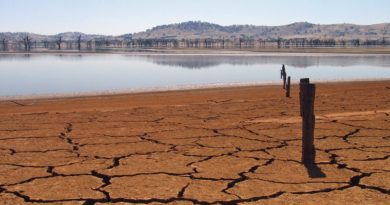Godwin Ojo:Ecosystem restoration, addressing living in agony with ourselves and nature-
Ecosystem Restoration and Addressing Living in Agony with Ourselves and Nature, being a paper presented by Dr Godwin Uyi Ojo, Executive Director, Environmental Rights Action/Friends of the Earth Nigeria during an event organized by Frontline Energy and Environmental Services to mark the World Environment Day June 5, 2021.
This year’s World Environment Day 2021 with the Theme, “Ecosystem Restoration,” provides the opportunity for critical reflections on the state of the nation with particular reference to ecosystem restoration in Nigeria. Nigeria is facing massive environmental degradation, deforestation, desertification and destruction of rural livelihoods. In northern Nigeria, the shrinking of Lake Chad by 90 percent has contributed to climate change and desert encroachment that has impacted about 10 million farmers and pastoralists seeking for farmlands, grazing lands, vegetation and water. Communities in Zamfara state, northwest Nigeria, have been at the receiving end of environmental and public health crisis and violence with hundreds of locals dying from lead poisoning from gold mining with serious ecosystem disturbance.
In southern Nigeria, environmental challenges of deforestation of tropical forests and mangroves, frequent oil spills and persistent gas flaring especially in the Niger Delta region where oil resources are located remains unabated. For example, the groundbreaking report of the United Nation Environment Program (UNEP) on the environmental assessment of Ogoniland submitted to the Nigerian government in August 2011 confirms that the Ogoniland is a wrecked environment from hydrocarbon pollution and required an initial fund of US$1 billion within five years for the cleanup and remediation that would take up to 25 years. The study further also confirmed that the underground water in Ogoniland which the people depend on is polluted 800 times above World Health Organization standards for potable drinking water. These environmental problems contribute to climate change, ecosystem disturbance, and impoverishment of over 70 percent of the 200 million population depending on natural resources.
According to the World Bank Poverty Clock, 2018, Nigeria is now the poverty capital of the world with almost half of its population – 86.9 million living in extreme poverty. Ecosystem disturbance and depletion of natural resources which the vast majority depend on is at the root cause of poverty. According to statistics, from the 122 million Nigerians in the working age bracket only 31 million Nigerians are employed. There is hunger in the land, poverty parades the streets and laughter is stifled. People are in need of basic necessities of life; food, water, and energy most of which come from ecosystems supply. Nigeria has reached a full bloom crisis point and is further sliding fast to the precipice like a rudderless ship. Things continue to degenerate and there is so much uncertainty and insecurity with each passing day with dozens of news of kidnapping, banditry, suicide, YahooBoys (internet fraudsters), murders and other forms of criminalities. We are now living in agonies with nature and ourselves.
How did we arrive at this unenviable state of affairs? There has been a deep-seated structural injustice in the pseudo federal government governance system over the ownership and management of natural resources. Specifically, the 1999 Constitution, under item 39 of the Exclusive Legislative Power vested natural resources, mines and minerals, oil mining, and natural gas on the federal government rather than to the state and citizens. This implies that the government in power are the rightful owners of the natural resources, petroleum resources and solid minerals. Throughout the world natural resources belong to the state. By appropriating such natural resources to the federal government, therefore, political and economic power also shifted to the centre. As a result, the state and citizens are thereby effectively colonized and as appendages whose resources, as much as possible, are dispossessed, appropriated and exploited to serve the appetite and interest of the internal colonisers.
The foregoing explains some elements in the Nigerian context that needs to be addressed. First, there is too much concentration of power in the federal government and the centre with a weak regional structure or the federating states as vassals. Notably, the force of internal colonialism ensured that regional and state ecosystems are plundered. In practice, it introduced the concept of the winner takes it all whereby aspirations to elected offices and elections especially at the federal level are notably filled with acts of war, violence, thuggery, and a “do or die” disposition that introduces guns, ballot box snatching, falsification of figures and other criminalities to ride to the seat of power. The seat of power and its occupiers in this way represent a physical and mental conquest of the people, a form of the continuing internal Colonialism out to exploit citizens. From the 100 percent derivation principle in 1963 Constitution it has been watered down to a paltry 13 percent in 1999 Constitution and till date. The clamour for fiscal federalism requires that regions and states become stewards of the environment and management of natural resources in their domain. Thus, national restructuring is needed to ensure that natural resource governance and control belongs to citizens and states where those resources are located.
Secondly, the failure of leadership in Nigeria is mostly felt in the area of natural resource management, environmental sustainability and the protection of traditional livelihood sources. Nigeria’s dependence on oil and gas revenue that is accounting for 65 percent of government expenditures and 88 percent of foreign exchange earnings has also witnessed weak institutions, lowering environmental standards and lack of enforcement and compliance to extant laws and regulations. As a result, the government that is unwittingly practicing internal Colonialism join forces with neo-colonial forces of neoliberalism to suppress the people. Therefore, transnational corporations at the behest of their national governments are allowed to get away with environmental racism because the standards deployed in USA and Europe are different from the standards deployed in the global south especially in Nigeria. Thus, national governments in the global south including Nigeria are unable to regulate or hold transnational corporations to account for their harmful extractive activities, oil and gas pollution and mining that results in environmental degradation, social dislocation, human rights abuses, destruction of livelihoods, pollution of water bodies, air and soil contamination. As a result, over 70 percent of the 200 million population is impoverished and their livelihoods sources seriously under threat throughout Nigeria.
Thirdly, Nigeria is a free rider state governed by acts of godfatherism in spaces of impunity in a patron-clientele relationship. The impunity of the internal Colonisers reinforce neo-colonialism and the obnoxious practices of the TNCs in their extractive activities that put profit before people. Impunity is flouting laws with reckless abandon and the inability to hold public officers accountable or to continue in lawlessness without any form of sanction or restrain. The notion of political godfatherism relates to the political class and continuous recycling of themselves in power and positions, or to dictate policy and practice and even selection of new crop of leaders in every sphere of life. Godfathers see themselves as semi/demi gods who must be obeyed or they will frustrate efforts no matter how noble for an inglorious cause for greed and self-worship. You must look in the mirror to rid yourself of any form of godfatherism that is essentially borne out of greed and selfishness. It can be likened to someone who has taken first in a race and still wants to take second slot. Nigeria must build strong institutions in terms of rules and norms of governance including the institutions to drive them rather than concentrating power on so-called godfathers in high places such as, Mr President, Mr Governor or Mr Chairman.
Ecosystem disturbance will continue due to increasing lack of access to justice. Environmental injustice impinges on ecosystem restoration and resilience. Access to justice is denied or narrowed in ways that favour the companies to continue environmental degradation with impunity. The concept of victims sleeping on their rights, or where violations are apparent, yet, the burden of proof on environmental issues that require scientific proof and huge legal fees are placed on the victims of environmental destruction. Rather, the TNCs should have the responsibility to discharge their responsibilities and show how they are meeting regulations and standards to preserve the environment and ecosystems restoration which they often neglect. As a result of impunity in the extractive and mining sectors, ecosystem disturbance is left unaddressed. There are over 10,000 oil spills sites in the Niger Delta and none has been adequately cleaned up. In northern Nigeria desertification and drying up of Lake Chad has put pressure on water supply, fisheries and rural livelihoods. Ecosystem restoration includes conservation efforts, and the need for local people to be involved in environmental protection, remediation and conservation.
There has been a misnomer in the classification of insecurity. National security can best be achieved through social protection. Most Nigerians are stakeholders without stakes and tangible benefits. And this is fueling insecurity. There is the need for expansive definition of national security not necessarily in the procurement of state of the art arms and munitions but in the building and investment in human and social capital of citizens. Curbing insecurity by deploying policemen and army as bodyguards can be a waste of time if there is no sense of national unity and joint stakes in nation building. To address insecurity, there is the need for national fiscal social protection for all unemployed citizens from the age of 18 years and for those without pensions from 65 years and above. National basic income scheme in the form of a monthly stipend can unlock productive potentials of innovative beneficiaries. It also has the high potential to build social cohesion, meet basic needs, bolster citizen’s sense of belonging, reduce the rate of crime and make them stakeholders with states in nation building.
The way forward is living in harmony with nature and ourselves and not in agony. Living in harmony with nature is a crucial challenge that requires a deep transformation in global production and consumption patterns. There is the need for a switch from fossil fuels dependence to Just Energy Transition in renewable energy alternatives. Environmental sustainability not only requires ecosystem recovery but also that socio-political and economic domains are subsumed as subsets of development. To action the Paris Agreement of 2015, a post petroleum economy is long overdue for Nigeria to shift focus from oil and gas to other productive sectors such as renewable energy sector and development of cleaner technologies to address climate change and provide green jobs. Nigeria is yet to make the commitment to switch from oil and gas to renewable energy sources even though European countries are already ending production of petrol-diesel engines from 2025 onwards. Nigeria can become the renewable energy hub for West Africa if it takes advantage of the emerging renewable energy sector and divest public finance, loans and subsidies from oil and gas exploitation and invest in renewable energy. There is the need for energy democracy in the form of decentralized energy systems in mini-grids and off-grids systems whereby individuals, communities and groups can form Energy Cooperatives as Prosumers for energy production and supply and share in roles and responsibilities as well as the benefits.
Living in harmony with nature requires reversing the ecosystem degradation to build the earth resilience in richer biodiversity, soil fertility, timber and fishery. According to the United Nations Decade on Ecosystem Restoration 2012-2030, “the restoration of 350 million hectares of degraded terrestrial and aquatic ecosystems in the world could generate US$9 trillion in ecosystem services, the removal of 13 to 26 gigatons of greenhouse gases from the atmosphere, and improvement of livelihoods of those who depend on them. It also helps to regulate diseases and reduce the risk of natural disasters and pandemics. At the national level, restructuring to ensure a return to local control of local resources is the surest way to ecosystem restoration. The environment is our life. It is not for sale. Ecosystem restoration now.




